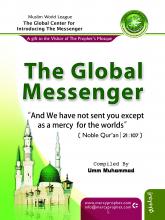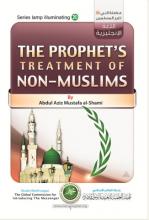The Prophet of Mercy Website
Muslim World League - Global Commission for Introducing the Messenger
The reforms affected by Islaam are as follows:
1. To start with, in religions, which existed or originated before Islaam, very often fasting was only compulsory for a particular section of the community. For instance, fasting was not necessary for the non-Brahmans among the Hindus. Among the Zoroastrians, fasting was necessary for their priests only. In the Greeks, fasting was only for the women. If fasting was considered to be a commendable and praiseworthy practice, then it should have been made equally necessary for all the followers of the religion without exception. Islaam has neither specified nor restricted fasting to certain sections of its followers, as did the other religions. It has given a general command to be followed equally by all its followers.
"So every one of you who is present (at his home and not travelling) during that month should spend it in fasting." (2:l85)
2. Religions other than Islaam generally follow the solar calendar: If the solar calendar was to be followed for determining the fasting dates, these dates would always fall in the same season and variation and changes in them would not be possible. So, if it occurred in the long or short days of the summer or winter, fasting would be either permanently difficult or permanently easy in different countries. In Islaam, however, the fasting dates are determined by the lunar calendar. Therefore, the fasting period changes from year to year with respect to the length of the day and the season of the year. The Islamic fasting month thus comes in different seasons in different countries and therefore its hardship and its ease keep on changing.
3. As far as the study of the inspired books of other religions is concerned, the author has not come across any command in them concerning exemptions from fasting under specific conditions. It is certainly not so in the Torah. It is stated in the Torah that if somebody does not fast for any reason, he would be slaughtered or murdered. It is even mentioned that a stranger, although a non-Jew, who comes to stay with the Jews is required to fast compulsorily. But in the Glorious Qur'aan, Allah with His Great Divine Wisdom has exempted all incapacitated people and those with a valid excuse from fasting e.g. children, expectant women, nursing women and women in their menstrual period. The old, the traveller, the sick and the weak are also exempted. The sick, the traveller and all others who are temporarily unable to fast have to fast after recovery from sickness, completion of the journey and removal of the excuse, for the number of days missed.
Those who are permanently incapacitated, however, have to feed one poor person in place of every fast missed. “But if any of you is ill, or on a journey, the prescribed number (should he made up) from days later. For those who can do it (with hardship), is a ransom, the feeding of one that is indigent.”(2:184) In the Jaami' Tirmizi, it has been narrated by Anas radhiyallahu anhu that the Prophet sallallahu alayhi wasallam said that Allah has excused fasting for pregnant and nursing women. In other words, if in Ramadhaan these women feel that fasting will be dangerous to their own or their child's life, they are allowed to postpone their fasting whilst the excuse lasts and make up the missed fasts later.
4. In other religions, there had been immoderation in fasting. Sometimes there was complete starvation for a number of days, and sometimes during fasting, one was permitted to eat everything except cereals and meat. Islaam adopted a moderate course in this also. It fixed the fasting period for one month but only forbade eating and drinking of all kind during the few hours of fasting, i.e. from dawn to sunset.
5. Among the Jains, a single fast lasts for many weeks. The Christian monks of Arabia used to fast for many days at a stretch. Among the Jews, a fast lasted for a full 24 hours. Islaam ordained fast from dawn to sunset only.
"Then complete your fast till the night appears." (2:187)
6. Among the Jews, the custom was that whatever they ate at the time of breaking the fast was all that they were allowed to eat. They were not allowed to eat any more after that. In other words, the next fast started from the time the previous one ended. Among the Arabs, it was customary not to eat anything more after having gone to sleep at night. In the beginning, this custom was also Common among Muslims. Once it so happened that during the month of Ramadhaan, the evening meal was not ready in the home of one of the Companions. His wife was still cooking the food, and while waiting for it he fell asleep. When the food was ready, she brought it to him but because he had already slept he could not eat it. Next day he fainted while fasting. The following verse was revealed on this occasion:
"And eat and drink, until the white thread of dawn appears to you distinct from its black thread." (2:187)
7. During the pre-Islamic era, the husband and wife would sleep separately at nights during the fasting period. However, since this was unnatural, when overpowered by their sexual desires, people indulged in intercourse. Islaam, therefore, forbade sexual intercourse only during the hours of fasting and allowed it during the night:
"Permitted to you in the night of the fasts, is the approach to your wives. They are your garments and ye are their garments. Allah knoweth what ye used to do secretly among yourselves but He turned to you and forgave you: so now associate with them, and seek what Allah hath ordained for you." (2:187)
8. Forgetfulness, error and faults are excused in Islaam. So, if somebody eats or drinks forgetfully, the fast does not break. It has been narrated by Aboo Hurayrah radhiyallahu anhu that the Prophet sallallahu alayhi wasallam said, "If anyone forgets when he is fasting and eats or drinks, he should complete his fast, for it is only Allah who has fed him and given him drink. "(Bukhaari, Muslim.)
9. Likewise, an act which, although against fasting, is not done deliberately but unintentionally, will not annul the fast.
10. Among the Jews, because fasts were mostly in commemoration of hardship and were symbols of grief, during fasting they did not clean their faces and would adopt a sorrowful appearance.
Islaam, however, takes the opposite stance in the period of fasting. To apply oil on the head, to use collyrium (Surmah) in the eyes, and to apply perfume while fasting are not prohibited in Islaam. To wash the face and to clean the teeth with Miswaak have also been encouraged. In addition to cleanliness, the aim is that the fasting person should not fall victim to show and hypocrisy and may not appear to be undergoing a great hardship and anguish in discharging this Commandment of Allah. On the contrary, an appearance of joyfulness, happiness and willingness should be presented.
11. The Prophet sallallahu alayhi wasallam used to fast very often. He had fixed certain days in the week and in the month for this purpose. For the followers of Islaam, these fasts were considered commendable (Mustahab) but not obligatory. In addition to these, the Prophet sallallahu alayhi wasallam sometimes used to fast continuously day and night. Fasting, in comparison to other worships, is obviously to some extent an act of hardship and suffering. It was, therefore, necessary to prevent the followers of Islaam from indulging in it to excess. This practice of wisaal (continuous fasting of day and night) was declared strictly forbidden by the Prophet sallallahu alayhi wasallam for his followers. When certain Companions asked for the reason, he replied, "I am not like you, for I am provided food and drink (by Allah)". (Bukhaari)
The objects of fasting
After the above details, let us see what the objects of fasting are in Islaam. Although these have been mentioned to some extent in the preceding pages, we wish to elucidate them further in some detail. The divine teachings of the Prophet Muhammad sallallahu alayhi wasallam are in accordance with Allah's Commands and are based on wisdom and prudence. These teachings include in them all spiritual, moral and material benefits. The principles and the purpose of the commands revealed by Allah have been explained and exemplified by the Prophet sallallahu alayhi wasallam himself. The purposes and intents of fasting have also been explained in the Glorious Qur'aan in three short sentences:
"To glorify Him in that He has guided you." (2:185)
"And that ye shall he grateful." (2:185)
"That ye may (learn) self-restraint." (2:183)
As has been described in previous pages, the life histories of all the prophets who were recipients of Divine Laws show that they had led an angelic existence for a certain period before they received revelation of Divine Guidance. During this period, they abstained, as far as possible, from food, drink and other human needs. Thus they enabled their souls to have communion with Allah and finally were rewarded with His Revelation. Prophet Moosaa alayhis salaam spent forty days in this way and then the Commandments of the Torah were entrusted to him. Prophet 'Eesaa alayhis salaam also spent forty days in the same way and only then did the fountainhead of wisdom flowed out of his heart and tongue. Muhammad sallallahu alayhi wasallam, the final Messenger of Allah, had been busy in worship for thirty days in the Hiraa cave when the light-giving Message of Allah started to be revealed to him.
From the above, it is clear that the foremost purpose of the duty of fasting was to follow the actions, which the prophets performed in those days of confinement. The Jews, following Prophet Moosaa alayhis salaam, think it appropriate to fast for forty days, but consider it compulsory to fast on the fortieth day. The Christians should have done the same and fasted for forty days following Prophet 'Eesaa alayhis salaam but in the same way as they did not comply with other commands and traditions of 'Eesaa alayhis salaam, following Paul, they did not follow this duty of fasting cither. The Muslims were commanded by Allah to follow their Prophet sallallahu alayhi wasallam, and spend a fixed number of days in the same manner.
"O ye who believe! casting is prescribed to you as it was prescribed to those before you." (2:183)
The teaching of the prophets of previous religions were forgotten by their followers in a short time but the thousands and millions of followers of Islaam still remember the teachings of their Prophet sallallahu alayhi wasallam and follow them. They do not eat and drink in the daytime and abstain from other sensual desires for one month, thus leading an angelic life for this period.
Shaykh Sayyid Sulaymaan Nadwi
Riyadul Jannah volume 9 No. 11/12
******






